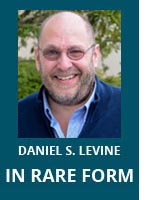 In the past day, I’ve had several rare and common diseases, including some horrendous stuff, but all in the name of science.
In the past day, I’ve had several rare and common diseases, including some horrendous stuff, but all in the name of science.
My sudden bout with a truckload of ailments came about when I learned that the American Liver Foundation had initiated an effort to help patients with liver diseases learn about clinical trials for which they may be eligible to participate.
The patient advocacy organization announced it had entered into a partnership with the digital health company Antidote Technologies, which allows patient organizations to integrate on their websites the Antidote Match search engine. The search engine allows patients to explore their eligibility for every open trial recruiting patients listed on ClinicalTrials.gov. That’s 55,350 open trials seeking 42,127,196 in 169 countries, according to the website’s latest tally. The information is updated daily.
Being curious, I took the search engine for a test drive. Though a patient could use ClinicalTrials.gov to do the same, Antidote Match offers a friendlier approach. It helps cut through the technical language that ClinicalTrials.gov relies on, as well as making it easier for patients to compare the eligibility requirements of open clinical trials they may be interested in pursuing.
“We make it a whole lot simpler for patients,” said Matt Krzywosz, partnerships marketing manager for Antidote.
In the world of rare diseases where patients are often without therapeutic options, finding an open clinical trial can provide access to a much-needed therapy, albeit an experimental one. For drug developers, spreading the word on clinical trials is essential and the search engine provides much needed help. Some 80 percent of clinical trials are delayed or closed due to an inability to find the patients needed for a study, Antidote says.
Searching for a trial is simple. Once a user enters the disease name, prompts will ask for the user’s sex, age, zip code, and how far the user would be willing to travel for a trial. It then runs through a series of up to ten additional questions, mostly ones that require a “yes” or “no,” to determine qualification for various open trials. The process is fast. When it is over, the engine populates a list for all trials for which the patient would be eligible with links that allow the user to obtain additional information.
Patients can choose to receive more information about study matches and are encouraged to work with their doctor to apply to a study site. The company is soon expected to add additional features that would let a user know when future trials are enrolling for which they may be eligible.
By pairing with patient groups such as the American Liver Foundation, Antidote is bringing the clinical trials search to the patient.
Antidote has created what it dubs “The Connect Network,” a community of health portals, non-profit organizations, patient advocates, and influencers who want to facilitate the matching of patients to clinical trials in the hopes advancing the pace of research and the development of new therapies.
That’s given the Antidote search engine impressive reach. The company says its now available on 250 organization’s websites, such as the American Liver Foundation, with access to 15 million patients.
Connect members embed the Antidote Match search engine on their websites, allowing their website visitors to research open clinical trials and connect them to the medical teams that can are running them. The tool is not restricted for what it searches for on any given member’s site. If you use it on the American Liver Foundation website, you can still search for all trials, even for diseases that don’t involve the liver.
Organizations that want to add the search engine to their sites can do so for free. It’s essentially a matter of cutting and pasting code provided by Antidote.
But Antidote Technologies is in the business of clinical trials recruitment. While it doesn’t make money from sharing the Antidote Match search engine, the company does get retained by pharmaceutical companies or CROs to find patients for open clinical trials.
Sharing its search engine is a goodwill gesture that establishes relationships with a network of patient groups it can reach out to when it is recruiting for a specific trial and may want to seek help.
In test driving Antidote Match over the past day, I’ve had Alzheimer’s disease, ALS, various MPS disease, an autoimmune disorder, some rare liver diseases, metastatic cancer, and more. I’m happy to report my ailments are gone and I’m feeling much better.
March 14, 2018

Stay Connected
Sign up for updates straight to your inbox.
